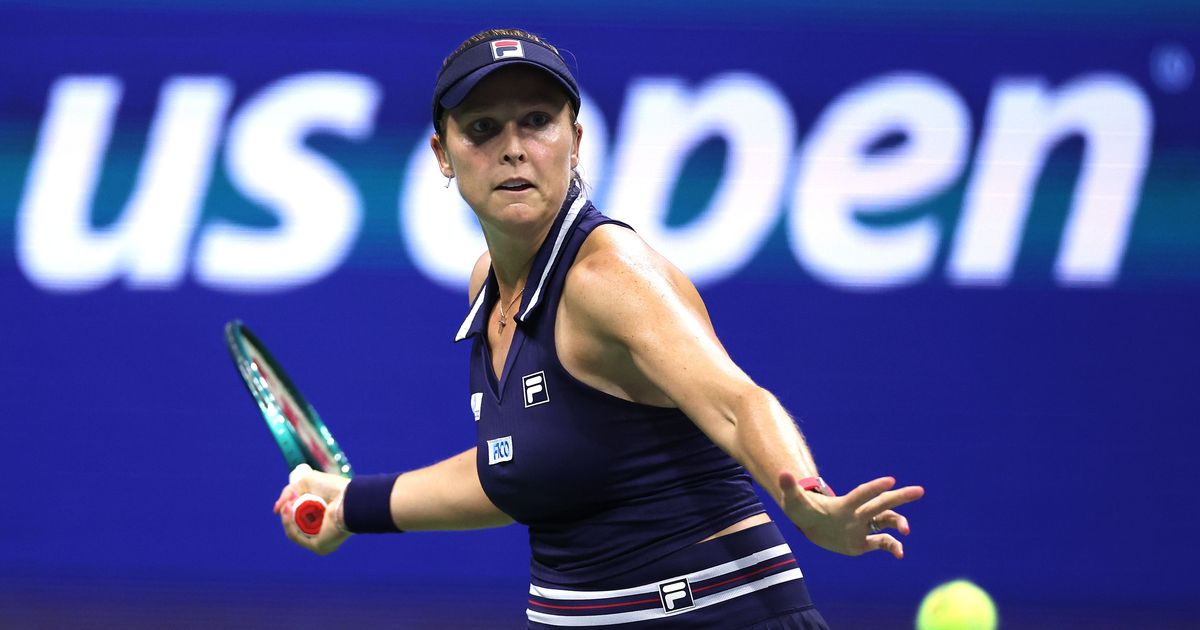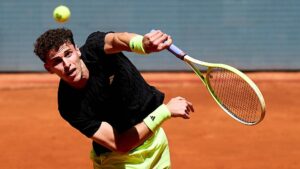
When the US Open draw more than a couple of week ago came out it was revealed that No.6 seed Jessica Pegula would be the opponent in what could be the final singles match of Shelby Rogers’ career.
“It’s a bummer,” Pegula told reporters. “I don’t like having to play any American, especially here. That part kind of sucks, but at the same time, at least it comes full circle in some way or another.”
And that’s exactly how it played out on the second night in Arthur Ashe Stadium. Predictably, Pegula beat her longtime friend in straight sets, but the on-court, postmatch theatrics were priceless.
“Oh, gosh,” Pegula said, wiping away the tears, “I’m going to get emotional, too. Congrats on a great career. Amazing. I just remember playing 16-and-unders with her and now we’re here — and I just think it’s so cool.”
At which point, Rogers ran onto the court and embraced Pegula. It was the perfect punctuation to a 15-year professional career well played.
Recently, the 31-year-old Rogers sat down with wtatennis.com to talk about her decision to retire. She seemed at complete peace with her decision.
“It’s been a lot of emotions, a lot of special moments, lots of hugs from other players,” Rogers said. “People have stopped me in every hallway and in the locker room, saying kind words. Would I have liked it to be later in the tournament? Sure.
“But at the same time, I’m grateful that I could have one more match on Ashe, with someone I’ve known for a very long time. A super kind, good friend.”
Her career, she said, has a movie-like element to it, but her body certainly feels like it was all-too real. Reel? After three knee surgeries in a span of seven years — 2018, 2023 and 2024 — it was time.
“And you feel other things starting to go when you are compensating — shoulder, wrist, oblique, the back, the hammy,” Rogers said. “Every day I felt like I was chasing something. It just started to become mentally exhausting.
“The preparation and the process to get on court and feel just OK. The rehab and the joy that I could get from the sport — a big reason that I love the sport — was a bit less and a bit less.”
Rogers, who grew up in Charleston, was first exposed to the sport she loves at the Family Circle Cup tournament on Daniel Island in South Carolina. She was a seven-year-old ball kid, providing the service balls along the baseline, not old enough to work the more challenging net position. Eventually she graduated to that coveted spot — and was chosen to give 2001 champion Jennifer Capriati her victory bouquet.
“And she kissed me on the cheek,” Rogers said, “and said, ‘One day you’ll play here.’ And I was like, `No, that’s crazy.’ To be able to see those players in person and make it so tangible, was really important.
“I had that opportunity to be around professional players, to be inspired and have that dream. One of my motivations in professional tennis was to inspire the next generation myself.”
The bottom-line numbers are impressive. Rogers produced a professional record of 307-262 and won $5.6 million in prize money. She didn’t win a title at the WTA Tour level but reached three finals — at Bad Gastein in 2014, 2016 Rio de Janeiro and 2022 San Jose.
She played Billie Jean King Cup for the United States in 2017 and advanced to the quarterfinals at the 2016 French Open and four years later at the US Open. During her career, Rogers scored seven wins over Top 10 players.
During the telecast of her final singles match, commentators debated over which was her biggest win. It was a split decision between her 1-6, 6-4, 7-6 (5) upset of Serena Williams in 2020 in Lexington and the stunning 6-2, 1-6, 7-6 (5) win over No.1 Ashleigh Barty later that year at the US Open.
Rogers has a preference.
“For me, I’d say beating Ash Barty was such a special win — not just because of the nature of the result and the location, but because she had beaten me five times before,” Rogers said. “We had played so many times that season and I had lost and lost and lost and lost and lost. And I was down a double-break in the third.
“She wanted to win that US Open so badly. I remember seeing her in Australia the next year and she was like, `You ruined my career.’ I was like, `I think that’s a stretch.’ That stood out to me the way the crowd responded. And the comeback. The overall vibe.”
There is another, less obvious match that she cherishes, too.
“My match after my first surgery,” Rogers said. “I played [Evgeniya] Rodina, and I won in my hometown. That was special since I’d been off the Tour for 13 months. To do that in that setting was really cool.”
She says she’ll miss the competition, being tested, pushing her body to the limit. The unique part of the sport — problem-solving on your own. Trusting that you can figure out a way to get out of it.
“Coming up with a level of tennis you didn’t think you could — little moments where you bring out this character in yourself,” Rogers said. “As an athlete there’s always goals left unchecked and accomplishments that you didn’t get done. There’s always more. But I’m taking time to appreciate what I was able to accomplish.”
Her short-term goals?
To be home in Fort Lauderdale for more than two weeks at a time. To spend time with her family, particularly husband John. To celebrate her nieces’ birthdays and holidays. After her first surgery, she did some commentary work for Tennis Channel and would like to try her hand at that again. She’ll also be enjoying her dogs — new rescue puppy Maple and seven-year-old Tilly.
Pegula, who lives nearby, has a new puppy, too, Dez.
“I’m sure I’ll see you in Florida,” Pegula said in her on-court interview. “We’ll take our dogs on more play dates.
“You’ve had some amazing wins here, amazing results at the US Open. Wishing you the best.”
Source: https://www.wtatennis.com/news/4114342/from-a-ball-kid-to-her-tennis-farewell-what-s-next-for-shelby-rogers


